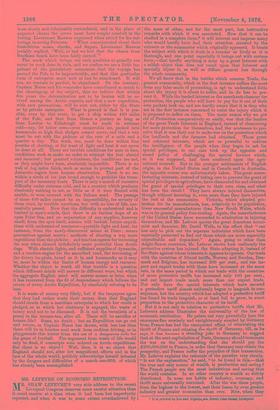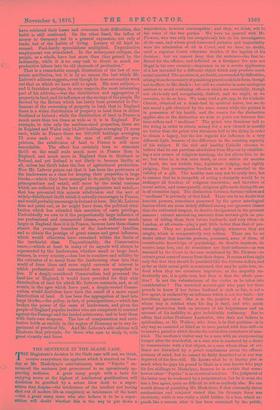MR. LEFEVRE ON ECONOMIC RETRIBUTION.
Liverpool Congress deserves more careful attention than reported, and when it was to some extent overshadowed by * It Is printed by Leo and Nightiniale, North John Street, Liverpool. The work which brings out such qualities so grandly can force,—that hardly anything is done by a great Interest with never be work done in vain, and we confess we are a little im- a selfish object that does not recoil upon that Interest and patient of the gratulatory assurances that the voyage has specially injure it, as well as diffuse general loss through proved the Pole to be impracticable, and that this particular the whole community. form of enterprise must now at last be abandoned. It will We all know that in the battles which concern Trade, the not, we venture to predict, be abandoned. On the contrary, general community, which in the first instance suffers the most Captain Nares and his comrades have contributed so much to from any false mode of proceeding, is apt to understand little the clearing-up of the subject, that we believe that within about the injury it is about to suffer, and to do less to pre- five years the determination not to be beaten will be re- vent it. While the landed interest or the merchants clamour for vived among the Arctic experts, and that a new expedition, protection, the people who will have to pay for it out of their with new precautions, will be sent out, either by the State own pockets look on, and are hardly aware that it is they who or by private enterprise. What is proved is that it is pos- are in the first instance concerned to resist the injury which it sible, even by this route, to get a ship within 450 miles is proposed to inflict on them. The main reason why we got of the Pole, and that from thence a journey as long as rid of Protection comparatively so easily, was that the leaders from London to Edinburgh must be made in extreme of the great Trade Interests in England, instead of clamouring cold—say, 50 below zero—over immovable ice, packed into for more protection for themselves, had the acuteness to per- hummocks so high that sledges cannot move, and that a way ceive that it was their cue to make war on the protection which must be cut with the pickaxe at the rate of a mile and a the landlords and the farmers had obtained. Those great quarter a day. The work, too, must be done within four and coherent interests, which are so powerful to confuse months of starting, or for want of light and heat it can never the intelligence of the people when they begin to ask for be done at all. Those are terrible conditions for men to face, special privileges, in our case took up the opposite and conditions such as make an order to attempt the .feat absurd sound policy of challenging the special favours which, and immoral ; but granted volunteers, the conditions are not, as it was supposed, had been conferred upon the agri- as they might have been, absolutely impossible. There is no cultural interest. But in the younger settlements of English wall of fog miles thick, such as seems to protect part of the origin, in the United States and in Canada and in Australia, Antarctic region from human observation. There is no sea the opposite course was unfortunately taken. The great mann- within a circle of ice just broad enough to prohibit the trans- factoring interests, instead of taking care to prevent the grant of port of the necessary boats. There is only a march of excessive special privileges to agriculture, have clamoured for and obtained difficulty under extreme cold, and in a country which produces the grant of special privileges to their own class, and what absolutely nothing to eat, as little as if it were floored with has been the result ? They have always injured themselves, marble, or were covered with the Sahara sand. The passage though without knowing it, even more than they have injured of those 400 miles cannot be an impossibility, for seventy of the rest of the community. Victoria, which adopted pro- them were, by terrible exertions, but with no loss of life, sue- tection for its manufactures, has, relatively to its population, cessf ally passed. Now that the difficulty is understood and is fewer successful manufactures than New South Wales, which limited in men's minds, that there is no further hope of an was in its general policy free-trading. Again, the manufacturers open Polar Sea, and no expectation of any supplies, however of the United States have succeeded to admiration in injuring small, from the spot itself, science will furnish future expedi- themselves and Mr. Lefevre quotes the great American econo- tions with undreamt-of resources—portable light and heat, for mist and financier, Mr. David Wells, to the effect that "one instance, from the newly-discovered mines at Disco ; secure has only to pick out the separate industries which have been preventives against scurvy ; methods of clearing a way more especially protected to find out those which are more especially expeditious than the pickaxe ; and traction-agents for traversing unprofitable and dependent." Again, going to other than the way when cleared indefinitely more powerful than Arctic Anglo-Saxon countries, Mr. Lefevre shows how uniformly the dogs. With electric lights, and sufficient supplies of dynamite, protective system has injured the State adopting it, instead of and a traction-engine for the smoothed road, the traversing of the State against whose interests it appears to operate. Our trade the dreary ice-plain, broad as it is, and hummocky as it may with the countries of liberal tariffs, Norway and Sweden, Den- be, must be within the limits of human energy and resource. mark and Belgium has increased 300 per cent., and our im- Whether the object is worth all that trouble is a question port and export trades with them have increased at the same which different minds will answer in different ways, but which rate, in the same period in which our trade with the countries - the aggregate English mind will answer sooner or later, when of more protective tariffs has increased only 100 per cent., it has recovered from the fit of despondency which follows the and our import trade much more than our export trade. return of every Arctic Expedition, by absolutely refusing to be Not only have the special interests which have secured from the highest to the lowest, met their 'losses by even greater have retrieved their losses and overcome their difficulties, this habit is still continued. On the other hand, the influx of money to Germany led to a general expansion, not only of trade, but of the habits of living. Luxury of all kind in- creased. Fool-hardy speculations multiplied. Unproductive employment was stimulated. In the subsequent collapse, the people, as a whole, have lost more than they gained by the indemnity, while it is no easy task to divert so much un- productive labour into its old channels of production."
That is a remarkable enough illustration of the law of eco- nomic retribution, but it is by no means the last which Mr. Lefevre's address suggests, even though he does not exactly work out that on which we have still to speak. His next subject,— and it furnishes perhaps, in some respects, the most interesting part of his address,—was the distribution and aggregation of property in land, and its influence on the savings of the people. He showed by the Return which has lately been presented to Par- liament of the ownership of property in land, that in England there is a wider distribution of property in land than in either Scotland or Ireland; while the distribution of land in France is much more than ten times as wide as it is in England. For example, to take only the medium-sized properties, there are in England and Wales only 54,500 holdings averaging 72 acres each, while in France there are 500,000 holdings averaging 75 acres each ; and in the case of still smaller pro- prietors, the subdivision of land in France is still more remarkable. The effect has certainly been to stimulate thrift on the small scale much more in France than in England, and much more in England than in Scotland or Ireland, and yet Ireland is not likely to become thrifty at all, unless her thrift takes the line of agricultural production. Now Mr. Lefevre points out that it has been the preference of the landowners as a class for keeping their properties in large blocks,—which they have managed to do partly by the laws of primogeniture and entail, still more by the social customs -which are reflected in the laws of primogeniture and entail,— that has prevented this minute subdivision and the sort of widely-distributed thrift which it actually encourages in France, and would probably encourage in Ireland or here. But Mr. Lefevre does not point out, as he might have done, the political retri- bution which has attended this assertion of caste privilege. Undoubtedly we owe to it the proportionally large influence of our professional and commercial classes,—an influence much larger in England than it is in France, because here these classes absorb the younger branches of the landowners' families, and so obtain the prestige of great names and great influence, which would otherwise have remained within the limits of
the territorial class. Unquestionably, the Conservative cause,—which at least in many of its aspects will always be represented by the landowners, whether small or large land- owners, in every country,—has lost in numbers and solidity by the extrusion of so many from the landowning class into that world of freer ideas and more rapid currents of interest in which professional and commercial men are compelled to live. If a _deeply-considered Conservatism had governed the land-law of England, it would have provided for that wide distribution of land for which Mr. Lefevre contends, and, at all events, in the ages which have past, a deeply-rooted Conser- vatism would doubtless have been the result of a more equal distribution of land. It has been the aggregation of land into large blocks,—the policy, in fact, of primogeniture,—which has broken the power of the caste of landowners, and given the people of England popular leaders who are competent to contend Nainst thePeerage and the landed aristocracy, and to beat them with their own weapons. The law of compensation and retri- bution holds as strictly in the region of Economy as in any de- partment of practical life. And Mr. Lefevre's able address will illustrate that principle, for those who care to study it, with great vivacity and force.



































 Previous page
Previous page